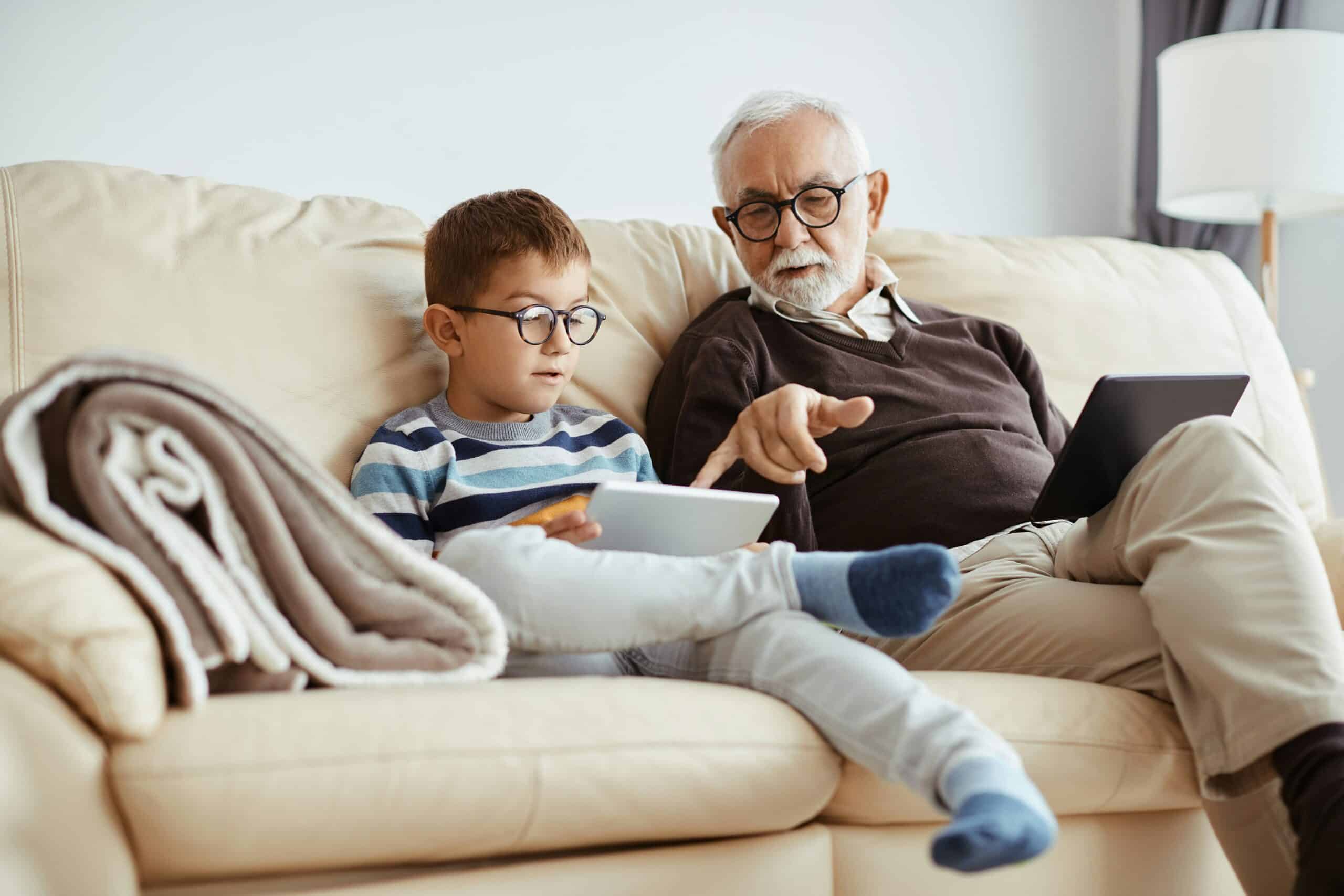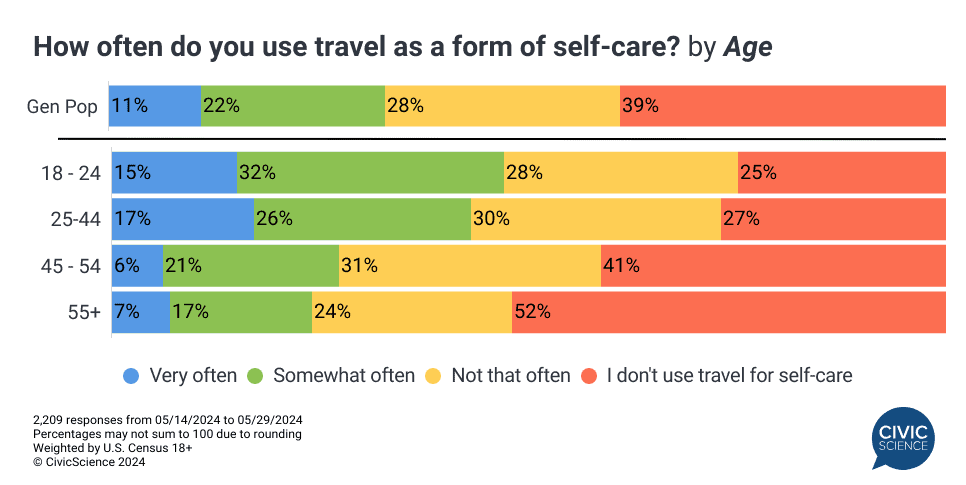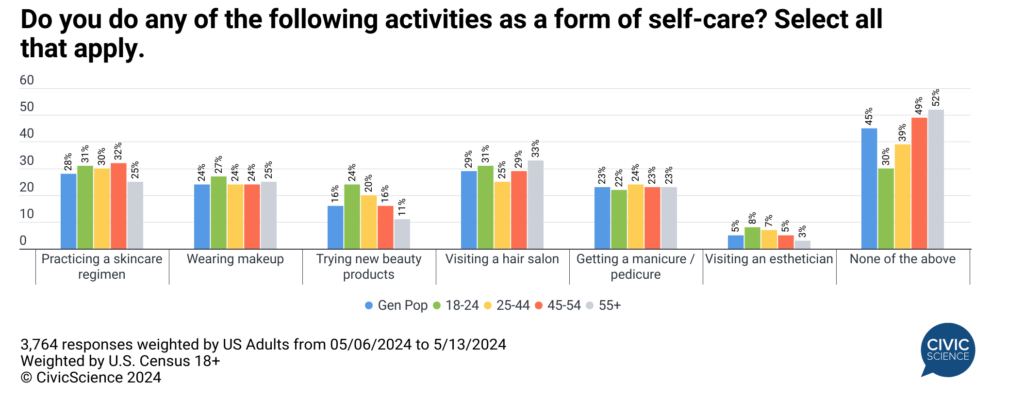Entertainment
From Entertainment to Beauty, Here’s How Older Americans Practice Self-Care Amid Concerns for Well-Being

A version of this article originally appeared in ROAR Forward as part of a collaboration with their quarterly ROAR Report. This article is only a small preview of the insights available to CivicScience clients. Discover more data.
In the last ROAR Report, we explored where Americans stand regarding their emotional well-being. Those results, coupled with May’s Mental Health Awareness Month prompted the question: “How do Americans feel about mental health and wellness in the country today?”
CivicScience polling data from April found the overwhelming majority of Americans (87%) were at least ‘somewhat’ concerned about mental health and emotional wellness in the country, including over 40% who were ‘very’ concerned in every age group. Millennials showed the most extreme concern, while the 55+ group was concerned but somewhat less urgently.1
With financial pressures, political news, a nearing election, and rising domestic and international tensions, what are Americans doing to prevent their kettles from boiling over?
Americans 55+ On Their Mental and Emotional Health
Self-care is one avenue. Overall, there is a very healthy percentage of Americans who are either aware of the need or are already taking care of their mental and emotional health through self-care (72%). The 55+ cohort reports a high level of commitment to self-care at 29%, but on the flip side, they also are the most likely to report that they are unfamiliar with the idea of self-care (25%). Both of these notions could indicate higher-than-average well-being compared to their peers, with some looking to maintain it, while others may not need to explore the idea of self-care, given they’re already on more solid footing in terms of their well-being.2
Friends/Family, Food, and Rest Keep Those 55+ On an Even Keel
CivicScience polling allows us to take an even deeper look at the actions Americans partake in for self-care. Sleeping is the most common form of self-care among the Gen Pop and across all generations, which the National Institute of Health endorses as a good practice. Honing in on the 55+ crowd, they are less likely to use the given choices nearly across the board. That said, their second most common choice for self-care is visiting family and friends. This makes sense, given they’re most likely to be empty nesters, so time with loved ones they might not regularly get to see is especially valuable.
Additional data show that Americans aged 55+ primarily turn to entertainment, such as watching TV/movies and reading, followed by listening to music and exercise for mental preservation, but they are less likely to engage in shopping, hobbies, and yoga.
Take Our Poll: Is self-care important to you?
55+ Travel to Visit Friends and Family Rather Than Self-Care
Roughly a third of all Americans travel for self-care ‘somewhat’ or ‘very’ often. Despite our findings in early 2024 showing that Americans 55+ planned on spending more on travel this year, they are the least likely to call that travel self-care. Less than half of this age group say they use travel for self-care at all, compared to 75% of adults aged 18-24. Instead, the 55+ demo ranks visiting friends and family as their strongest motivation for travel.

Beauty as a Form of Self-Care
The beauty and cosmetics industry has shown to be resilient in the face of inflation, and while there are many reasons for this, its value to the American self-care consumer should not be overlooked. Fifty-five percent of U.S. adults said they use one or more beauty-related activities for self-care. And while it is less common among older Americans, 48% is still a noteworthy percentage.
Americans aged 55+ are most likely to visit a hair salon for an emotional lift, followed by wearing makeup and having a skincare regimen. They align with other generations on manicures/pedicures but, like many others, show less interest in seeing an esthetician.

Let Us Know: How much time do you typically dedicate to beauty-related self-care activities in a week?
With such an emphasis on self-care across the board and countless means to do so, it is likely that a wide variety of industries will be impacted, at least in some way, by consumers seeking to maintain or improve their mental well-being. Those gains may help mitigate some losses in other areas if there are continuing declines in well-being scores.










